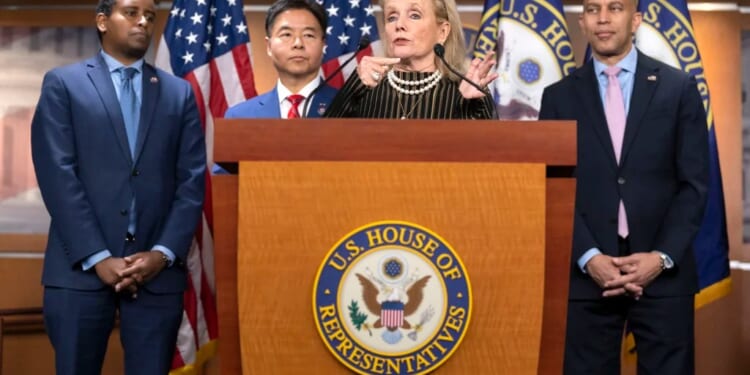The government shutdown may be over, but Republicans and Democrats are now divided over whether Obamacare subsidies should be subject to abortion funding restrictions if Congress agrees to extend them.
Senate Majority Leader John Thune (R-SD) said last week that any bipartisan deal on subsidies would have to include language similar to the Hyde Amendment, which prohibits federal funding for abortion except in the narrow circumstances of rape, incest, or life-threatening complications for the mother.
Thune said that “without Hyde protections,” a one-year extension to the subsidies as Democrats have demanded, doesn’t “get close” to what is needed to strike a deal.
A senior aide to a majority member on the House’s Energy and Commerce Health subcommittee told the Washington Examiner that a “Hyde application to any extension would definitely be necessary,” and said that they would also want any legislative vehicle to go through regular order in the committee.
Rep. Kat Cammack (R-FL), a member of the Health subcommittee, said that Hyde provisions would “absolutely” need to be included in any deal struck over the subsidies.
“I mean, there’s a reason why we have those protections in place,” Cammack said. “And I mean, it stands to reason that anything that we do using taxpayer dollars should include Hyde provisions.”
A spokesperson for Rep. Gus Bilirakis (R-FL) said in a statement that the Florida Republican “does not support the use of federal funds to pay for abortions. Accordingly, he believes the Hyde Amendment remains an essential component of any health care legislation.”
But Rep. Debbie Dingell (D-MI), a leading Democrat on the House’s Energy and Commerce Health subcommittee, told the Washington Examiner that incorporating Hyde Amendment language into any compromise on Obamacare subsidies is “a non-starter.”
“What we need to be doing is addressing the fact that Americans across the country are not going to have access to healthcare next year because they can’t afford their insurance,” Dingell said. “So they’re not going to go get healthcare when they need it, they’re going to end up in emergency rooms, and [it will end up] increasing the costs overall on the healthcare system.”
When asked about Thune’s comment, Dingell said that he is “playing games with the American people’s health.”
“We shouldn’t be playing games. We should be straightforward. We should be fixing the healthcare system,” said Dingell.
A spokesperson for Rep. Diana DeGette (D-CO) also said any Hyde Amendment restrictions would be a “nonstarter” for the congresswoman.
Rep. Jim McGovern (D-MA) also told the Washington Examiner that “no federal funds can be used for abortion already” and that Republicans are “looking for excuses not to extend the ACA tax credit.”
Democrats in the House and Senate argue that Obamacare subsidies do not fund abortion services because insurers, in theory, are supposed to collect an abortion surcharge from enrollees if they cover abortions. In practice, however, insurance companies only solicit one payment from enrollees and only submit a single claim to the federal government to collect the subsidies, which anti-abortion advocates say muddies the bookkeeping.
Anti-abortion advocates argue that the 2010 Patient Protection and Affordable Care Act, which created the Obamacare marketplace, effectively allows for federal dollars to fund abortion services because it is not under the jurisdiction of the Hyde Amendment, which only applies to appropriations bills that fund the executive departments.
However, Obamacare-related expenses are not part of the normal appropriations process, as they are funded through a separate system. Anti-abortion advocates contend that the original Obamacare legislation was written intentionally without Hyde protections.
Republicans have attempted to incorporate Hyde Amendment protection language into Obamacare subsidies since 2017, notably during the original GOP “repeal and replace” effort under the first Trump administration.
More recently, it’s been a focus of Senate Republicans. Sens. John Boozman (R-AR) and Roger Wicker (R-MS) introduced a bill in January that would prohibit insurance companies from using Obamacare subsidies to cover abortion services and require plans to charge an “abortion surcharge” if they chose to provide those services.
Last month, during the shutdown, Sen. Josh Hawley (R-MO) introduced a similar bill to prohibit federal subsidies from providing both abortion and gender transition medical services, a duo some advocates refer to as “Hyde plus.”
Conservative advocacy groups have been increasing pressure on the GOP to include Hyde Amendment protections in Obamacare subsidies since before the government shutdown.
Susan B. Anthony Pro-Life America previously told the Washington Examiner that the issue would be recorded as part of their Pro-Life scorecard metric that ranks officeholders, as well as a key factor in their support for the 2026 midterm elections.
However, it’s unclear whether House Republicans view attaching Hyde protections to Obamacare subsidies with the same level of importance as their Senate colleagues.
House Speaker Mike Johnson (R-LA), who has a strong anti-abortion track record, has stated that the subsidy structure “needs real reform,” but he has not specified whether Hyde Amendment protections would be included in his list of priorities.
Rep. Dan Crenshaw (R-TX), another member of the Health subcommittee, said that “no matter what we do, Hyde has to be in there.”
Crenshaw told the Washington Examiner that he instead supports using the funds that would have been used for subsidizing premiums to instead go toward Health Savings Accounts that Obamacare enrollees can use for co-pays and deductibles.
A similar proposal has been floated in the Senate by Health Committee Chairman Bill Cassidy (R-LA), who suggests instead that the funds be used to create Flexible Spending Accounts for enrollees. While patients own HSAs and get to roll over the funds each year, funds from a federally subsidized FSA would be returned to the government at the end of the plan year.
Neither Cassidy nor Crenshaw has presented bill text yet that specifies the details of their plans, including whether or not they would have Hyde protections.
When asked by the Washington Examiner about restrictions on abortion funding being attached to an ACA extension, Rep. Greg Landsman (D-OH) called it “frustrating.”
“I think they should let people just have their healthcare,” Landsman said. “It’s so frustrating that they have put up every barrier to just people getting their healthcare. This is, this is really simple. People are not getting healthcare through their employer. They go to the marketplace. They need a little extra help paying for their healthcare. These are their constituents, and they continue to put up roadblock after roadblock after roadblock, and voters hate it.”
Still, it’s unclear whether Johnson will put any deal on the expiring subsidies up to a vote on the floor, as the speaker has not made the promise to do so, unlike Thune, who did as part of negotiations to end the government shutdown. McGovern said that, even if a Senate bill included Hyde protections, he was unsure whether Johnson would bring any legislation about Obamacare to the House floor.
“The way this congress works is, if you want to make something into a law, the Senate and House both have to pass it, and it goes to the White House,” McGovern said. “We don’t have an assurance that Mike Johnson will bring anything up. He’s too busy trying to derail the Epstein files.”
The Washington Examiner contacted the Speaker’s office for comment.
For his part, House Minority Leader Hakeem Jeffries (D-NY) told the Washington Examiner, “Our position is our position, a three-year clean extension of the Affordable Care Act tax credit.”
David Sivak contributed to this report.
















